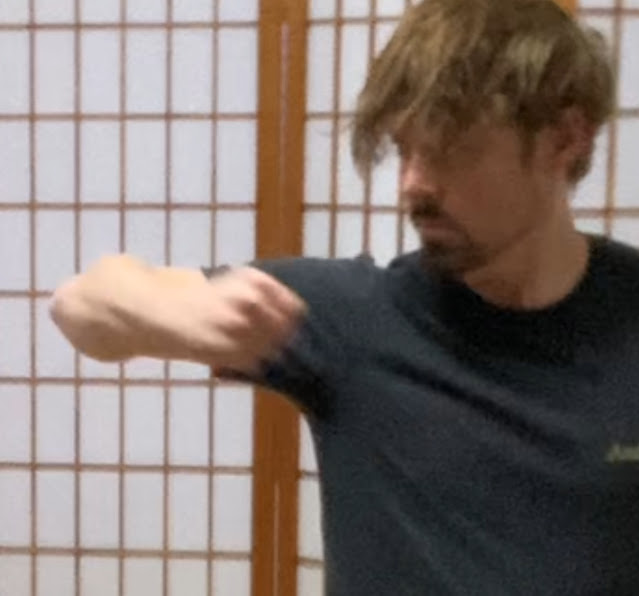One young Japanese Nidan asked me “How can I become a world class karateka?” While one could give an exhaustive answer, I thought to focus on a single point in isolation:
"DOING HOMEWORK OUTSIDE OF DOJO TRAINING!"
 |
| "Practice must not be limited to the dojo". -- "The world is my dojo!" (T.Asai). |
That is, practicing and refining what you’ve been doing in
your Dojo Training. This type of ‘training’ can range from a very brief mini sessions, less than a minute, to a session that exceeds class times. Likewise,
it can be in a dojo or anywhere for that matter, in a dogi and obi, or in daily
apparel. Sports gear or suit!
Doing this practice reinforces and refine what your respective 先生 (Sensei) taught you.
For example, if a bad habit is highlighted, one can simply
focus on correcting this over and over again with repetition. Actually, this
literally makes correcting errors and refining easy. Be specific for yourself
and watch your skill incrementally improve.
 |
| Hidari chudan gyaku-zuki: 'Homework Practice' - March 20th, 2024. |
Explosive speed and power can also be developed in these practices. Using specific bodyweight calisthenics and weights to strengthen specific muscle groups (especially ‘functional weight training’) can really lift one’s skill level. However, age, base fitness, health, injury and so forth, must be taken into account. The key here is to listen to your body to protect your wellbeing. Training can be hard, but we must all avoid harming ourselves as much as possible. As Asai Tetsuhiko Sensei always said: “Step-by-step”.
Returning to the analogy of homework, think of children who
attend all their classes at school, yet skip their homework. With the exception
of a very small minority, these children academically don’t excel. They might
get through school and graduate. They might even attain a degree at university.
Nevertheless, they will never maximize their potential. It reminds me of some
of my colleagues at college who lived by the saying “C’s get degrees”. My
personal aim was always the A+, which meant if I fell short, I was still far
above the passing rate.
While I am by no means academically smart, I realized with
doubling my workload—doing ‘lots of homework’—I'd get the top scores most
of the time; moreover, the content of what I learned would permanently remain with me. Many senior karateka who focus on practical 'bujutsu karate' stress that "...regularly training in your shoes and daily clothes is not only good, but also absolutely essential".
Accordingly, every day I train in my dogi in the dojo, but I also often
self-practice—outside of dojo—in my regular clothing, as mentioned
above. When the weather is good, I enjoy practicing outdoors on various surfaces. These extra practices are my “Homework Sessions”. One of my
coaching sayings is “Muscle memory = 'brain washing' your body to act and react optimally”.
I do not claim to be good at karate like those above me,
Asai Sensei, Nakamura Masamitsu Sensei, Osaka Yoshiharu Sensei, et al. These gentlemen
are literally masters of the art, karate legends… Nonetheless, I’m following in
their footsteps as best I can, with all my limitations. While I may never
reach anywhere near their respective levels, such seniors have and continue to
inspire me on a daily basis here in Japan. It is also a great honor to share such masters personal teachings with the younger Japanese Shotokan exponents, and karateka around the world.
Irrespective of any deficits that I have, one asset I have is self-awareness and an academic (and practical) understanding (and methodology) of pedagogy: “the art of teaching/coaching and learning/improvement”. This academic background has no meaning as an instructor of Shotokan Karate unless it achieves real world results; that is, tangible and on-going karate skill improvement.
Some people might find it hard to get motivated, but if you think too much you've already lost the battle. It is in the post-training/post-practice period where you will find great satisfaction. As I have said countless times before, karate training must not be based on feelings. Rather, like brushing your teeth or bathing each day. That way, irrespective of enjoying it or not, keiko continues regardless. This is 'THE DISCIPLINE OF KARATE-DO', which transcends the dojo and positively influences other dimensions of your life.
 |
| Snapping 'Migi uraken jodan yokomawashi uchi'. |
© André Bertel. Oita City, Japan (2024).
No comments:
Post a Comment